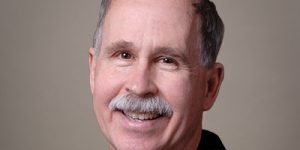
Father Mike Stubbs is the pastor of Holy Cross Parish in Overland Park and has a degree in Scripture from Harvard University.
by Father Mike Stubbs
Winston Churchill was one of the greatest orators of the 20th century. His eloquence inspired the British people during World War II and urged them on to victory.
“We shall fight on the beaches, we shall fight on the landing grounds, we shall fight in the fields and the streets, we shall fight in the hills, we shall never surrender.” Although carefully constructed, his speeches always sounded fresh and spontaneous. When practicing them, Churchill would even sometimes deliberately include minor flaws and slips in his delivery, to create a more natural impression. That way, he thought that he would come across as more believable, less artificial.
In Sunday’s second reading, drawn from the First Letter to the Corinthians, St. Paul similarly draws attention to his less-than-perfect speaking abilities: “I came to you in weakness and fear and much trembling, and my message and my proclamation were not with persuasive words of wisdom.” In this disclaimer, St. Paul may be contrasting himself with more polished speakers with the rhetorical training he lacked.
In his later writings, St. Paul will more openly criticize his competition, other Christian missionaries who have depended upon their speaking skills to achieve success among the Corinthians: “For I think that I am not in any way inferior to these ‘super apostles.’ Even if I am untrained in speaking, I am not so in knowledge” (2 Cor 11:5-6). Evidently, St. Paul’s unimpressive speaking ability reflected his background, and perhaps also his personality. Unlike Churchill, St. Paul did not fake it to win favor with his audience. At the same time, St. Paul seeks to capitalize upon his weaknesses.
By conceding his deficiencies, St. Paul believes that he will find his greatest strength. Only then can he tap into God’s power. That is why St. Paul contrasts human wisdom with God’s power. In that contest, which do you think will win? The answer is obvious. That explains the purpose of St. Paul’s preaching, which is admittedly imperfect by the world’s standards: “So that your faith might rest not on human wisdom, but on the power of God.”
For St. Paul then, drawing attention to his defects in public speaking goes beyond presenting a human face for his audience, establishing a persona with imperfections that they could relate to. St. Paul interprets the situation in terms of his theology. Divine grace will work in him because he does not get in its way. Since he recognizes his own weakness, he allows God’s grace full rein to operate. Because of that grace, St. Paul is able to accomplish far more than he ever could on his own.
The theology of St. Paul consistently downplays the importance of human effort, in order to emphasize God’s role in our salvation. In our reading, St. Paul focuses attention upon his shortcomings in public speaking, to give us an example of how God works in our lives. He turns what most would consider a liability into an asset.

